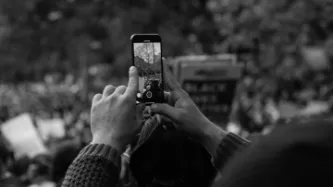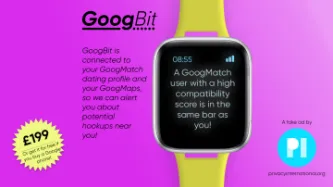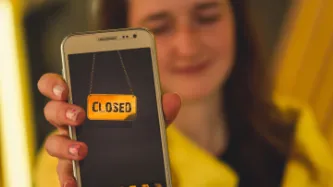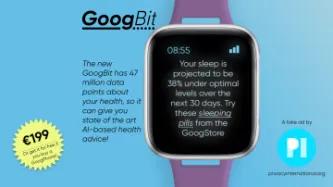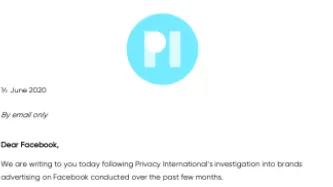Search
Content type: News & Analysis
Name: Google/Fitbit mergerAge: GestatingAppearance: A bit dodgy. One of the world’s biggest tech giants, trying to purchase a company that makes fitness tracking devices, and therefore has huge amounts of our health data.I don’t get it. Basically Google is trying to buy Fitbit. As if Google doesn’t already have enough data about us, it now wants huge amounts of health data too.Oh, Fitbit, that’s that weird little watch-type-thing that people get for Christmas, wear for about a month while they…
Content type: News & Analysis
Last week, Facebook announced that it would allow voters in the United States to opt out of seeing social issue, electoral or political ads from candidates in their Facebook and Instagram feeds.
Whilst Facebook’s attempt to increase the agency of users during the election period is commendable, the binary choice left to voters to either see political ads or not see them at all is a limited and short-sighted one.
Real transparency concerns are still unaddressed
Whilst Facebook…
Content type: Video
Immediately following the UK general election in December 2019, we worked with Open Rights Group to commission a YouGov poll about public understanding and public opinion about the use of data-driven campaigning in elections.
The poll used a representative sample of 1,664 adults across the UK population.
'Data-driven political campaigning' is about using specific data about you to target specific messages at you. So, for this might involve knowing that you are, for example, likely to…
Content type: Video
This podcast is part of a special series from PI's Reproductive Rights and Privacy Project.
The series comes out on the last Monday of every month.
You can listen and subscribe to the podcast where ever you normally find your podcasts:
Spotify
Apple podcasts
Google podcasts
Castbox
Overcast
Pocket Casts
Peertube
Youtube
Stitcher
and more...
Content type: People
Nuno (he/him) is a Senior Technologist at PI. He conducts technical research, desk research and data analysis to inform our work and since joining has contributed to policy developments across several areas of PI's work.
Nuno is also coordinating our ongoing work on Public Education. The focus of this strand of work is the production and dissemination of trustworthy explainers and guides with the aim of assisting the public in enjoying their privacy rights in a more conscious and informed way.…
Content type: News & Analysis
IMSI catchers (or stingrays as they are known in the US) are one of the surveillance technologies that has come to the forefront again in the protests against police brutality and systemic racism that have been sparked by the murder of George Floyd on 25 May 2020.
An International Mobile Subscriber Identity catcher – in short an “IMSI catcher” – is an intrusive piece of technology that can be used to locate and track all mobile phones that are switched on in a certain area. It does so by…
Content type: Case Study
Chinese artist Ai Weiwei creates art that highlights the harmful effects of surveillance on society — and is himself a target of persistent surveillance by the Chinese government. In an article for Agence France-Presse, he said, "In my life, there is so much surveillance and monitoring -- my phone, my computer ... Our office has been searched, I have been searched, every day I am being followed, there are surveillance cameras in front of my house.”
Weiwei is an artist, blogger, documentary…
Content type: Long Read
Monday, 16 June 2025
It’s 7:33 am. Lila’s GoogBit watch vibrates. “You got 6 hours and 57 minutes of sleep last night, including 2 hours and 12 minutes of deep sleep”, the watch reads. “In total, you tossed and turned for 15 minutes only”. Taking into account Lila’s online browsing activity, her sleep pattern, the recent disruptions in some of her other biorhythms, as well as her daily schedule, GoogBit watch has calculated the very best minute to wake her up.
Content type: Call to Action
Google wants to know everything about you.It already holds a massive trove of data about you, but by announcing its plans to acquire the health and fitness tracker company Fitbit, it now clearly wants to get its hands on your health too. We don’t think any company should be allowed to accumulate this much intimate information about you. This is why we’re trying to stop its merger with Fitbit.Google and Fitbit need the European Commission’s approval before they can merge. The merger would have…
Content type: Examples
Excluded groups such as sex workers and asylum seekers are being left behind in the UK’s COVID-19 response as control measures amplify existing health inequalities and put life-saving advice and care further out of reach.
The closure of services and some GP registrations, a lack of access to technology, distrust and fear of authorities, unsuitable or insecure accommodation, and reduced income are among the many challenges facing people in vulnerable circumstances in England.
Doctors of…
Content type: Examples
South America has become the scene of one of the worst humanitarian crises in recent times. The crisis involving migrants and refugees from Venezuela involves children, adolescents, and young people who have left their country of origin to settle in surrounding countries, either due to political or economic reasons, sometimes both.
This study delves into the harsh reality of children, adolescents and young migrants and refugees from Venezuela who are caught up in the economic and political…
Content type: Press release
Today, the ICO has issued a long-awaited and critical report on Police practices regarding extraction of data from people's phones, including phones belonging to the victims of crime.
The report highlights numerous risks and failures by the police in terms of data protection and privacy rights. The report comes as a result of PI’s complaint, dating back to 2018, where we outlined our concerns about this intrusive practice, which involves extraction of data from devices of victims, witnesses…
Content type: Advocacy
Privacy International (PI), Fundaciòn Datos Protegidos, Red en Defensa de los Derechos Digitales (R3D) and Statewatch responded to the call for submission of the UN Special Rapporteur on contemporary forms of racism, xenophobia and related intolerance on how digital technologies deployed in the context of border enforcement and administration reproduce, reinforce, and compound racial discrimination.
This submission provides information on specific digital technologies in service of border…
Content type: Long Read
There are few places in the world where an individual is as vulnerable as at the border of a foreign country.As migration continues to be high on the social and political agenda, Western countries are increasingly adopting an approach that criminalises people at the border. Asylum seekers are often targeted with intrusive surveillance technologies and afforded only limited rights (including in relation to data protection), often having the effect of being treated as “guilty until proven…
Content type: Press release
On 15 June 2020, Google formally notified the European Commission of its proposed acquisition of Fitbit, enabling them to capture a massive trove of sensitive health data that will expand and entrench its digital dominance. Privacy International is calling on EU regulators to block the merger.
In November 2019, Google announced its plan to acquire Fitbit, a company that produces and sells health tracking technologies and wearables - including smartwatches, health trackers and smart scales -…
Content type: Call to Action
You might have read our investigation into advertisers who upload your data on Facebook and found out some companies doing the same to you. Well, you can join us and hold them accountable by sending your own Data Subject Access Request (DSAR)!Before you get started we suggest you read our FAQ and take a look at our 7+1 tips to make the most out of your DSAR before and after.To do so you simply need to copy the message bellow and send it to the companies that uploaded your data despite…
Content type: Explainer
Hello friend,
You may have found your way here because you are thinking about, or have just submitted, a Data Subject Access Request, maybe to your Facebook advertisers like we did. Or maybe you are curious to see if Policing, Inc. has your personal data.
The right to access your personal data (or access right) is just one of a number of data rights that may be found in data protection law, including the European Union's General Data Protection Regulation, better known as "GDPR", which took…
Content type: Long Read
Introduction
In August 2019, when Facebook announced a few new features for advertisers such as ads in search, PI decided to take an in-depth look at what features the company offers its users when it comes to understanding its advertising practices. One of these features, which caught our attention is Facebook Ads Preference, a tool that among other things, lists businesses/advertisers that have uploaded your personal data to target you with (or exclude you from) ads on the platform.
Content type: Report
Back in October 2019, PI started investigating advertisers who uploaded personal data to Facebook for targeted advertising purposes. We decided to take a look at "Advertisers Who Uploaded a Contact List With Your Information", a set of information that Facebook provides to users about advertisers who upload files containing their personal data (including unique identifier such as phone numbers, emails etc...). Looking at the limited and often inaccurate information provided by Facebook through…
Content type: Advocacy
Dear Facebook,
We are writing to you today following Privacy International’s investigation into brands advertising on Facebook conducted over the past few months.
Privacy International (“PI”) is a UK-registered charity that promotes the right to privacy at an international level. It is solely responsible for the research and investigation underpinning its publications.
In an attempt to exercise our rights under GDPR (specifically the right to data access) as Facebook users and better…
Content type: Examples
A mix of city data and reports from building superintendents and porters provides evidence on how New York City’s residents’ behaviour has changed during the lockdown. Among the findings so far: residents are recycling 27% more, particularly clear glass, and total garbage collected has dropped, especially in wealthy areas, where some residents left for country homes, but risen in the poorest areas. Scholars of consumption habits hope to learn more about how shutdowns affect people’s use of…
Content type: Examples
The AI firm Faculty, which worked on the Vote Leave campaign, was given a £400,000 UK government contract to analyse social media data, utility bills, and credit ratings, as well as government data, to help in the fight against the coronavirus. This is at least the ninth contract awarded to Faculty since 2018, for a total of at least £1.6 million. No other firm was asked to bid on the contract, as normal public bodies’ requirements for competitive procurement have been waived in the interests…
Content type: Examples
The Delaware County of New Castle is participating in a pro-bono programme run by the Cambridge, Massachusetts start-up Biobot Analytics, which analyses sewage for the coronavirus in order to estimate the number of people infected in a particular area, hoping to use the results to make better health decisions. Wastewater epidemiology has been used in the past to combat polio. Also joining the Biobot programme are wastewater treatment plants in or near Denver, Honolulu, Indianapolis, Florida’s…
Content type: Examples
Between March 29 and May 28, residents of Nashville, Tennessee submitted 3,748 reports of potential violations of the Safe at Home order, including locations such as restaurants, parks, churches, and funeral homes, and violations such as promoting live music while it was prohibited, or failing to wear a mask correctly. By May 11, the Metro Public Health Department had yet to issue a single citation, instead viewing complaints as an opportunity to educate businesses and individuals about how to…
Content type: Examples
Concerns that contact tracing could expand to purposes beyond public health gained some weight when the Minnesota Department of Public Safety Commissioner John Harrington told press that law enforcement was using “contact tracing” to investigate protesters arrested after the murder of George Floyd. Minnesota public health authorities found that Harrington actually meant they were engaging in the normal process of law enforcement investigations, and not, as he had implied, using data from Covid-…
Content type: Examples
Immunity passports, under consideration in a number of countries, may violate US disability law, enable discrimination, and create a two-tiered exclusionary society. They are not really comparable to vaccination cards for diseases such as yellow fever or meningitis, which are required for entry into a number of countries or universities, because in those cases vaccines are available. Antibody testing for COVID-19, however, has many uncertainties, as the extent to which antibodies confer…
Content type: Examples
After problems with its TraceTogether contact tracing app, Singapore is planning a comprehensive contact tracing system in which it will distribute to all its 5.7 million residents a wearable device that will identify people who have interacted with people carrying the coronavirus. The devices can be worn on a lanyard or carried in a handbag. Critics are concerned that it will be difficult to tell what the device is doing or what information it sends to back-end servers.
Source: https://mobile…
Content type: Examples
The lack of data protection laws and the absence of a privacy commission are contributing factors to Pakistan’s failure to investigate or remedy security flaws in the country’s recently-launched COVID-19 tracking technology, which partially depends on a system originally developed to combat terrorism. While there are no reported cases of harassment or targeting based on the leak online of the personal details of thousands of COVID-19 volunteers, the lack of response fails to boost citizens’…
Content type: Examples
While acknowledging the WHO’s advice that retaining antibodies to the coronavirus after recovering from COVID-19 is not yet scientifically confirmed to confer immunity, the International Air Transport Association believes that immunity passports could be important in helping air travel resume. Documented passengers could bypass many of the protective measures currently planned, which include temperature screening, physical distancing, modified boarding processes, and wearing masks.
…





